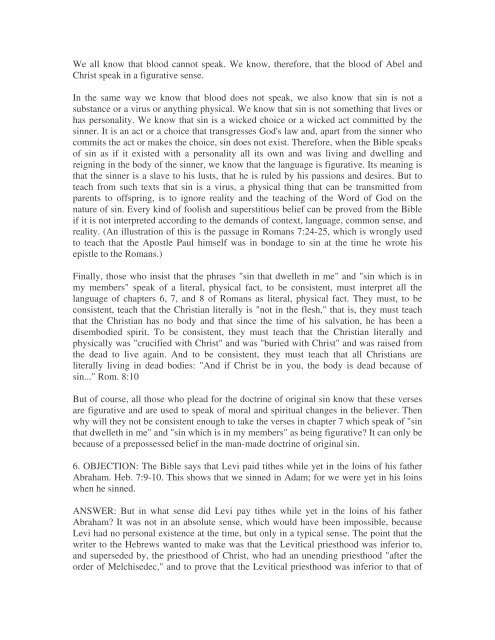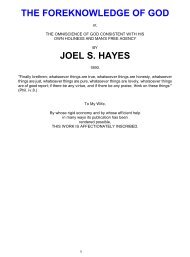Are Men Born Sinners? - Library of Theology
Are Men Born Sinners? - Library of Theology
Are Men Born Sinners? - Library of Theology
Create successful ePaper yourself
Turn your PDF publications into a flip-book with our unique Google optimized e-Paper software.
We all know that blood cannot speak. We know, therefore, that the blood <strong>of</strong> Abel and<br />
Christ speak in a figurative sense.<br />
In the same way we know that blood does not speak, we also know that sin is not a<br />
substance or a virus or anything physical. We know that sin is not something that lives or<br />
has personality. We know that sin is a wicked choice or a wicked act committed by the<br />
sinner. It is an act or a choice that transgresses God's law and, apart from the sinner who<br />
commits the act or makes the choice, sin does not exist. Therefore, when the Bible speaks<br />
<strong>of</strong> sin as if it existed with a personality all its own and was living and dwelling and<br />
reigning in the body <strong>of</strong> the sinner, we know that the language is figurative. Its meaning is<br />
that the sinner is a slave to his lusts, that he is ruled by his passions and desires. But to<br />
teach from such texts that sin is a virus, a physical thing that can be transmitted from<br />
parents to <strong>of</strong>fspring, is to ignore reality and the teaching <strong>of</strong> the Word <strong>of</strong> God on the<br />
nature <strong>of</strong> sin. Every kind <strong>of</strong> foolish and superstitious belief can be proved from the Bible<br />
if it is not interpreted according to the demands <strong>of</strong> context, language, common sense, and<br />
reality. (An illustration <strong>of</strong> this is the passage in Romans 7:24-25, which is wrongly used<br />
to teach that the Apostle Paul himself was in bondage to sin at the time he wrote his<br />
epistle to the Romans.)<br />
Finally, those who insist that the phrases "sin that dwelleth in me" and "sin which is in<br />
my members" speak <strong>of</strong> a literal, physical fact, to be consistent, must interpret all the<br />
language <strong>of</strong> chapters 6, 7, and 8 <strong>of</strong> Romans as literal, physical fact. They must, to be<br />
consistent, teach that the Christian literally is "not in the flesh," that is, they must teach<br />
that the Christian has no body and that since the time <strong>of</strong> his salvation, he has been a<br />
disembodied spirit. To be consistent, they must teach that the Christian literally and<br />
physically was "crucified with Christ" and was "buried with Christ" and was raised from<br />
the dead to live again. And to be consistent, they must teach that all Christians are<br />
literally living in dead bodies: "And if Christ be in you, the body is dead because <strong>of</strong><br />
sin..." Rom. 8:10<br />
But <strong>of</strong> course, all those who plead for the doctrine <strong>of</strong> original sin know that these verses<br />
are figurative and are used to speak <strong>of</strong> moral and spiritual changes in the believer. Then<br />
why will they not be consistent enough to take the verses in chapter 7 which speak <strong>of</strong> "sin<br />
that dwelleth in me" and "sin which is in my members" as being figurative? It can only be<br />
because <strong>of</strong> a prepossessed belief in the man-made doctrine <strong>of</strong> original sin.<br />
6. OBJECTION: The Bible says that Levi paid tithes while yet in the loins <strong>of</strong> his father<br />
Abraham. Heb. 7:9-10. This shows that we sinned in Adam; for we were yet in his loins<br />
when he sinned.<br />
ANSWER: But in what sense did Levi pay tithes while yet in the loins <strong>of</strong> his father<br />
Abraham? It was not in an absolute sense, which would have been impossible, because<br />
Levi had no personal existence at the time, but only in a typical sense. The point that the<br />
writer to the Hebrews wanted to make was that the Levitical priesthood was inferior to,<br />
and superseded by, the priesthood <strong>of</strong> Christ, who had an unending priesthood "after the<br />
order <strong>of</strong> Melchisedec," and to prove that the Levitical priesthood was inferior to that <strong>of</strong>






